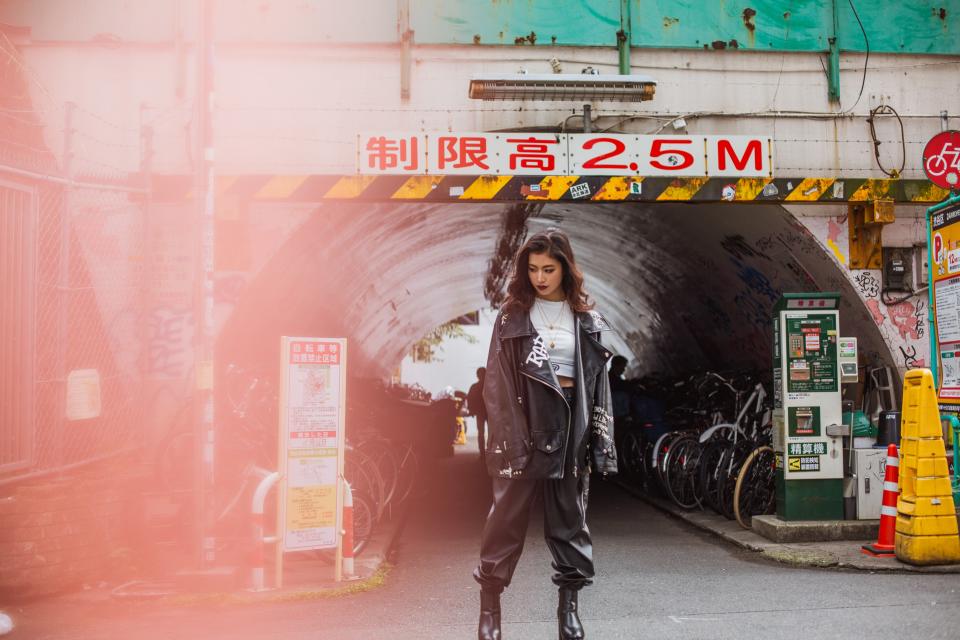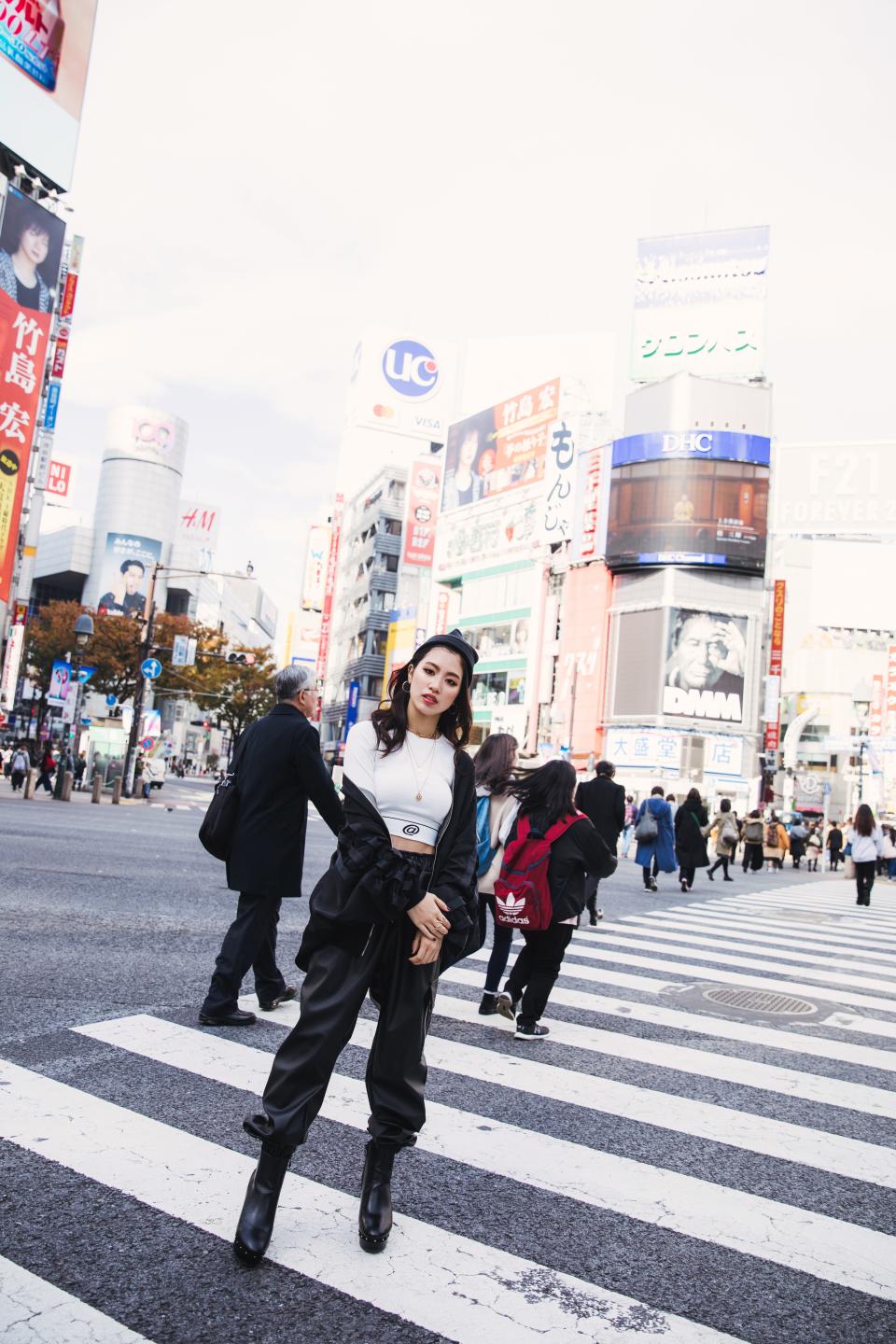Japanese Singer MIREI Tackles #TimesUp and Mental Health on Debut Album "Take Me Away"
Beneath the neon glow of Shinjuku, the glistening sheen of Ginza, and the glittery twinkle of Harajuku, Tokyo has its shadows. On her debut album Take Me Away, 21-year-old performer MIREI tackles modern-day Japan, shining a light on issues like depression, sexual harassment, and the cultural pressures of conformity that are affecting the country’s youth.
Born in Osaka, MIREI was introduced to the power of song through karaoke nights with her family—she learned to sing from her mom—and long car rides soundtracked by ‘90s and ‘00s pop mixes. During the second grade, she enrolled in dance school, where her training eventually blossomed into a preoccupation with international pop icons like Rihanna and Lady Gaga. “I experienced how it feels to be on stage,” she tells Teen Vogue. “I wasn’t very good at expressing my emotions and I was very shy, but singing and dancing just came naturally. I never doubted that I would become a musician and performer.”
At 12, thanks to software like GarageBand, she began making music on her own. By 13, she had caught the attention of major record labels, but MIREI was far from finished honing her craft: She spent her eighth grade year in New York City—nearly 7,000 miles away from her Osaka home—where she performed as part of the Gospel For Teens choir, winning the top prize during Amateur Night at the Apollo. The following year, at age fifteen, she moved back to Japan—this time landing in Tokyo, where she’s been ever since.
“This year is the Olympic year for Japan. Tokyo is evolving as a city and society, and I’m feeling it right now living here. Tokyo is a really good city and I’m proud of my country, but I think it has too many anonymous pressures and problems,” MIREI admits. “As a musician who can voice my thoughts; an artist who went to NYC to chase her dream; a woman who lives in Tokyo, I thought I should sing my opinion now.”
On Take Me Away (released Jan. 31), MIREI celebrates her city over a hypnotic soundscape of shimmery pop, R&B, and future bass, simultaneously refusing to gloss over its imperfections. “It’s exciting to [live and] work here, but you know what? Being in Tokyo alone is the worst. Tokyo has everything and [when I moved here alone] I wasn’t old enough to choose what was right and what was wrong at first. I have friends like me here, but many of them lost their way to temptations, just like the girls in my video. It’s a reality of Tokyo nightlife.”
MIREI is referring to the music video for the album’s titular track, which addresses anxiety, uncertainty, and feelings of not belonging. (“I don’t wanna go, go, go / ‘Cause nobody will know, know, know who I am / People only know, know, know / A fraction of me not, not, not who I am,” MIREI sings in the heart-baring first verse.) The powerful visual, which chronicles the somber misadventures of a group of young women in Tokyo, unveils the painful isolation one can feel in even the most bustling, populated metropolis.
The clip also puts a magnifying glass over the phenomenon of Japanese “papakatsu,” or young girls with sugar daddy relationships. “When I was in high school, I had a few friends who were doing papakatsu for real,” the singer explains. “They always had top brand makeup and bags; I didn’t know how they had so much money. I found out because they were posting gorgeous dinners on Instagram stories and complimenting their daddies on Twitter. I had a part-time job after school at the time and, if I can be honest, felt ridiculous about doing that while constantly comparing myself to papakatsu. A little money from adults could be huge for young girls, but many girls lose a big part of themselves for it.”
The complicated “papakatsu” isn’t the only social issue MIREI takes on with her album. On the swirling synth-pop ballad “Not a Number,” the artist criticizes society’s lax response towards sexual harassment in Japan, where, according to NHK, nearly 50% of women report they’ve experienced “unwanted touching” while out in public. Predatory behavior also permeates the music industry in Japan, where MIREI says “some managers hold the business cards of TV executives like a deck of cards, asking their talent and idol singers, ‘Which one can you go to dinner with?’ Of course, that also includes an expensive hotel room.”

MIREI
217..NINAWith her music, MIREI hopes to amplify the global conversation surrounding sexual harassment and assault in Japan. “Rape and assault is not rare to young girls in the Japanese entertainment industry; we can’t say or do anything about it,” she says. “They tell us we have to deal with certain behaviors because we chose to be in [the industry]. That’s obviously not right. We have to make people aware; it’s our human right to say no. We need to change the perception and functionality of the whole industry. We have so many R. Kellys here and we have to kick them out.”
Every track on Take Me Away captures an intimate experience MIREI has encountered, whether it be heartbreak (“Lazy Boy,” “Thought You Were Mine”), loneliness (“Lonely in Tokyo”), or the butterflies-in-your-stomach thrill of falling in love (“Feel Brand New”). The album represents her truth as both an artist and young Japanese woman, which is perhaps why one of its most salient messages speaks to anti-conformity and authentic self-expression.
“Young major label Japanese artists are idolized in an unhealthy way,” the singer shares. “That’s why we can’t say who we are dating even though we sing about love in almost every song. Also, no matter how popular we are, it’s taboo to say something about politics. I wanna change our society and fill the country with personal opinions. That’s necessary for us to evolve.
“I want to crush the image of the ‘kawaii’ Japanese girl,” she continues. “The majority of Japanese music is idol music, so the lyrics are very easy and simple. It seems like the media wants to see easy, inoffensive girls, and I strongly disagree with that. I promise you, most Japanese girls aren’t these things. We have our own opinions and we are much stronger than you think. I respect how Japanese girls are dealing with these problems smartly. I want to show that to the world through my album.”

MIREI 2
217..NINALet us slide into your DMs. Sign up for the Teen Vogue daily email.
Want more from Teen Vogue? Check this out: 19-Year-Old Beabadoobee Is Making Music for the Outsiders
Originally Appeared on Teen Vogue

